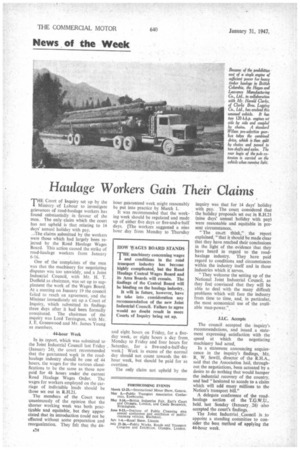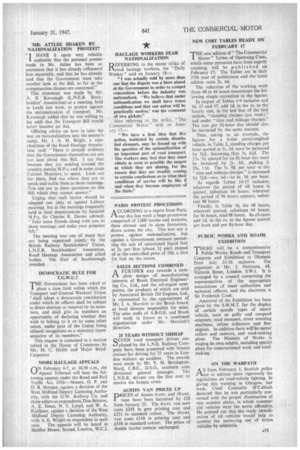Haulage Workers Gain Their Claims
Page 26

Page 27

If you've noticed an error in this article please click here to report it so we can fix it.
THE Court of Inquiry set up by the Ministry of Labour to investigate grievances of road-haulage workers has found substantially in favour of the men. The only claim which the court has not upheld is that relating to 14 days' annual holiday with pay.
-The claims submitted by the workers were those which had largely been rejected by the Road Haulage Wages Board. This action caused the strike of road-haulage workers from January 6-16.
One of the complaints of the men was that the machinery for negotiating disputes was too unwieldy, and a Joint Industrial Council, with Mr. H. T. Dutfield as chairman, was set up to supplement the work of the Wages Board. At a meeting on January 19 the council failed to reach an agreement, and the Minister immediately set up a Court of Inquiry. which submitted its findings three days after it had been formally constituted. The chairman of the inquiry was Lord Terrington, with Mr. J. E. Greenwood and Mr. James Young as members.
44-hour Week In its report, which was submitted to the Joint Industrial Council last Friday (January 24), the court recommended that the guaranteed week in the roadhaulage industry should be one of 44 hours, the wages for the various classifications to be the same as those now paid for 48 hours under the current Road Haulage Wages Order. The wages for workers employed on the carriage of indivisible loads should be those set out in R.H.21.
The members of the Court were unanimously of the opinion that the shorter working week was both practicable and equitable, but they appreciated that its introduction could not be effected without some preparation and reorganization. They felt that the 44
hour guaranteed week might reasonably be put into practice by March 1.
It was recommended that the working week should be regulated and made up of either five days or five-and-a-half days. [The workers suggested a nine hour day from Monday to Thursday and eight hours on Friday, for a fiveday week, or eight hours a day from Monday to Friday and four hours for Saturday, for a five-and-a-half-day week.] Work in excess of the normal day should not count towards the 44hour week, but should be paid for as overtime.
The only claim not upheld by the inquiry was that for 14 days' holiday with pay. The court considered that the holiday proposals set out in R.H.21 (nine days' annual holiday with pay) were reasonable and equitable in present circumstances.
" The court think," the report explained, "that it should be made clear that they have reached their conclusions in the light of the evidence that they have heard in regard to the roadhaulage industry. They have paid regard to conditions and circumstances within the industry itself and in those industries which it serves.
"They welcome the setting up of the National Joint Industrial Council, as they feel convinced that they will be able to deal with the many difficult problems which will face the industry from time to time, and, in particular, the most economical use of the available man-power.", Accepts The council accepted the inquiry's recommendations, and issued a statement expressing satisfaction with the speed at which the negotiating machinery had acted.
In a statement announcing acquiescence in the inquiry's findings, Mr. R. W. Sewill, director of the R.H.A., said that the Association had, throughout the negotiations, been actuated by a desire to do nothing that would hamper the industrial recovery of the country, and had "hesitated to accede to a claim which will add many millions to the Nation's transport bill."
A delegate conference of the roadhaulage section of the T.G.W.U., held. last Sunday (January. 26) also accepted the court's findings.
The Joint Industrial Council is to appoint a standing committee to consider the best method of applying the 44-hour week. MR. ATTLEE SHAKEN BY NA 110N ALIZATION PROTEST?
I HAVE it upon very reliable authority that the personal protest made to Mr. Attlee has been so enormous that it has already influenced him materially, and that he has already said that the Government must take another look at the Bill, so far as the compensation clauses are concerned." This statement was made by Mr. A. E Kavanagh (L.N.E.R. Stockholders' Association) at a meeting, held in Leeds last week, to protest against the nationalization of transport. Mr. Kavanagh added that he was willing to lay odds that the Transport Bill would never become an Act.
Offering advice on how to take the war on nationalization into the enemy's camp, Mr. J. A. M. Bright, a vicechairman of the Road Haulage Association. said: "There is already evidence that the Government themselves are not too sure about this Bill. I say that because they are sending around the country certain M.P.s, and in some cases Cabinet Ministers, to speak. Look out for them, find out where they arc to speak and tackle them at those meetings. You can put to them questions on this Bill which they cannot answer."
Urging that such tactics should be adopted not only at special Labour meetings, but at the meetings frequently held in their Constituencies by Socialist M.P.s, Sir Charles R. Davies advised: " Take some friends along with you to those meetings and make your presence felt."
The meeting was one of many that are being organized jointly by the British Railway Stockholders' Union, L.N.E.R. Stockholders' Association, Road Haulage Association and allied bodies. The • Earl of Scarborough presided.
DEMOCRATIC RULE FOR T.G.W.U.?
THE Government has been asked to place a time limit within which the Transport and General Workers', Union "shall adopt a democratic constitution under which its officers shall be subject to direct election or removal by its members, and shall give its members an opportunity . of declaring whether they wish to belong to it or to some other union, under pain ofthe Union being refused recognition as a statutory representative of its members."
This request is contained in a motion tabled' in the House of Commons by Mr. M. C. Hollis and Major BoydCarpenter.
MORE HAULAGE APPEALS
(IN February 6-7, at 10.30 a.m., the V Appeal Tribunal will hear the following appeals under the Road and Rail Traffic Act. 1933:—Messrs. 0. P. and D. B. Morgan, against a decision of the West Midland Deputy Licensing Authority, with the G.W. Railway Co. and three others as respondents, Don Bristow, A.. E. Jones, N. T. Lloyd, and W, A. Faulkner, against a decision of the West Midland Deputy Licensing Authority, with A, E. Wright as respondent in each
case. The appeals will be heard at Halifax House, Strand, London, W.C.2, PARIS PROTEST PROCESSION
A CCORDING to a report from Paris, 1-.1 one day last week a huge procession comprised of 2,000 lorries and taxicabs, three abreast and in close formation, drove across the city. This was not a protest . against nationalization, but against a Government measure permitting the sale of unrationed liquid fuel at 2s. per litre (about l pint) instead of at the controlled price of 10d. a litre for fuel on the ration.
SALES SECTIONS COMBINED
AFURTHER step towards -a complete merger of manufacturing interests of Brush Electrical Engineering Co., Ltd., and the oil-engine companies, the products of which are sold by Associated British Oil Engines, Ltd., is represented by the appointment of Mr. I. A. Marriott to the Brush board, as local director responsible for sales. The sales staffs of A.B.O.E. and Brush, will work in future as a combined organization under . Mr. Marriott's direction.
25 YEARS WITHOUT MISHAP
SEVEN road transport drivers employed by the L.N.E. Railway Company have been. presented with bronze crosses for driving for 25 years in London without an accident. The awards were made by Mr. V. M. BarringtonWard, C.B.E., D.S.O., southern area divisional general manager. The L.N.E.R. drivers are the first ever to receive the bronze cross.
AUSTIN VAN PRICES UP
PRICES of Austin 6-cwt. and 10-cw-t. vans have been increased by £20 from January 25. The 6-cwt. van now costs £245 in grey priming coat and £251 in standard colour. The 10-cwt. van costs £310 in priming coat and £318 in standard colour. The prices of Austin lorries remain unchanged,
NEW COST TABLES READY ON FEBRUARY 17
THE new edition of "The Commercial Motor" Tables of Operating Costs, which many operators have been eagerly awaiting, will be pu bl is h ed on February 17. The Tables are in their 37th year of publication and the-latest edition costs 2s. 6d.
The reduction of the working week from 48 to 44 hours necessitates the following simple correction to the figures: In respect of Tables 1-9 inclusive and 14, 15 and 17. add Id. in the Is. to the hourly rate, in the last line of the first section, "standing charges (per week)," and under "time and mileage charges." The rate per 8i-hour day should also be increased by the same amount.
Thus, taking as an example, the figures for a 6-ton petrol-engined vehicle, in Table 2, standing charges per hour quoted as ls. 3d. must be increased by 3id., becoming thus 3s, 6id. The 27s. 7d. quoted for an 84-hour day must be increased by 2s. 4d., .making it 29s. lid. The 5s. 9d. per nour in the "time and mileage charges" is increased by 5d.—say, 6d.—to 6s. 3d, per hour.
As regards Tables 10-13 inclusive, wherever the period of 48 hours is quoted, substitute 44 hours: wherever the period of 96 hours appears, substitute 88 hours.
Finally, in Table 16, for 48 hours, wherever quoted, substitute 44 hours; for 96 hours, read 88 hours. In all cases add id, in the .1s. to the figures quoted per hour and per 8i-hour day.
PUBLIC WORKS AND ROADS EXHIBITION
THERE will be a comprehensive Public Works, Roads and Transport Congress and Exhibition at Olympia from July 21-26 inclusive. The organizer is Mr. J. Pattisson, 68, Victoria Street, London, S.W.1. It is arranged by a council comprising the representatives of the appropriate associations of local authorities and technical officers, and the chairman is Sir Frederick Cook.
Approval of the Exhibition has been given by the S.M.M.T. for the display of certain specific types of motor vehicle, such as gully and cesspool emptiers, road sweepers, street watering machines, refuse collectors and fireengines. In addition there wilt be motor rollers and mowers, and road-making plant. The Ministry of Works is staging its own exhibit, including special plant for constructional work and roadmaking.
ON THE WARPATH
AS from February 1, Scottish police are to enforce more vigorously the regulations on road-vehicle lighting. In giving this warning in Glasgow, last week, Chief Constable M'Culloch declared that he was particularly concerned with the proper illumination of rear number plates, in which commercial vehicles were the worst offenders. He pointed out that the ready identificationof all vehicles would help to combat the increasing use of stolen vehicles by criminals.












































































